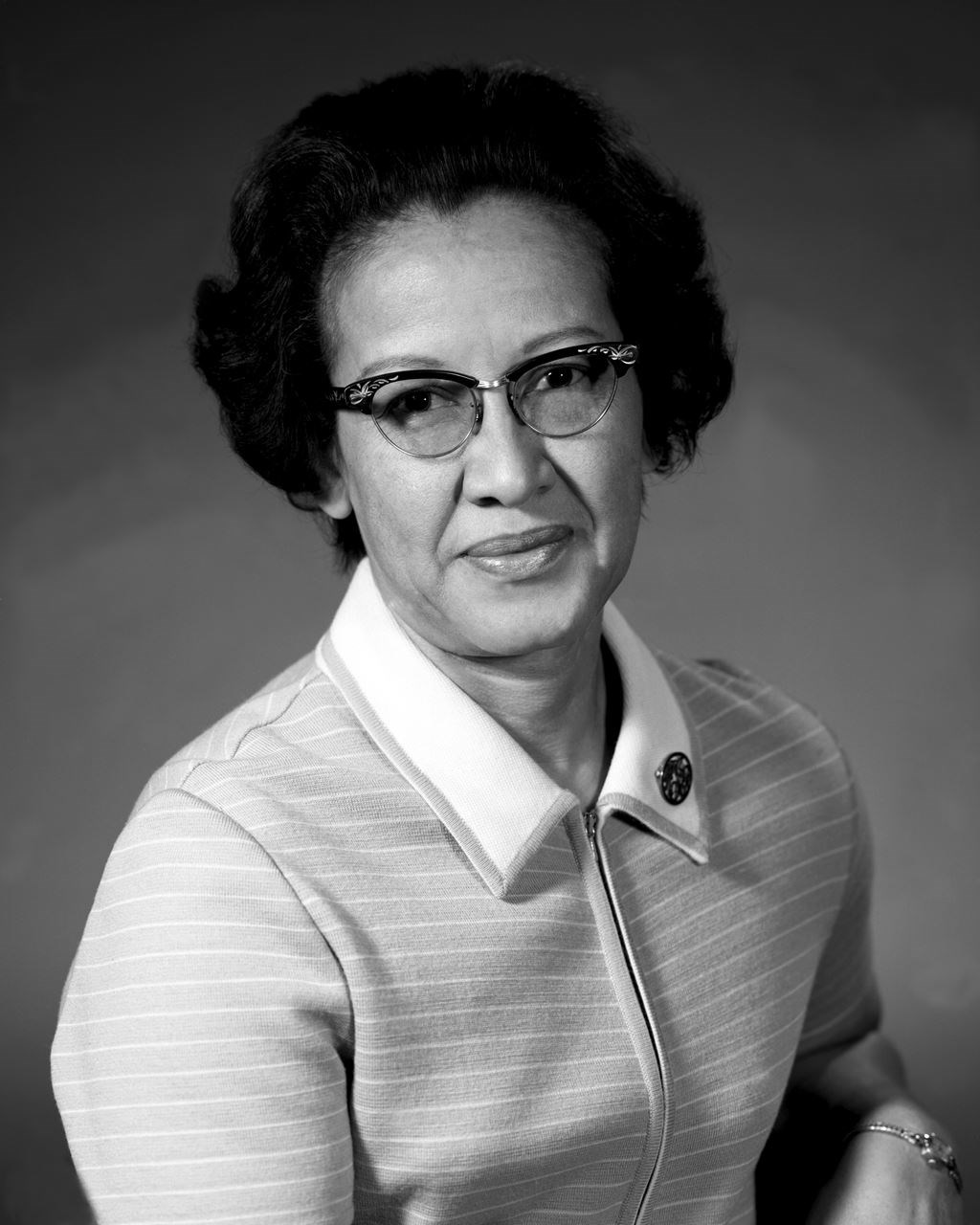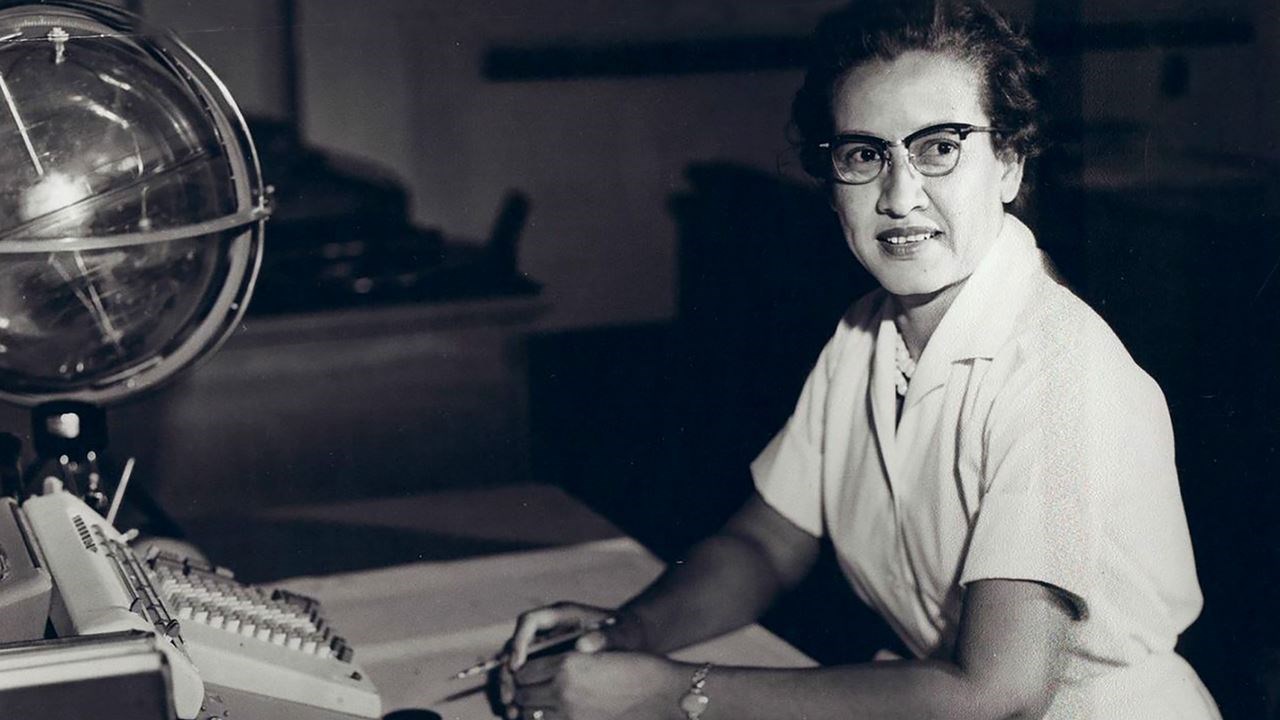Like what you do, and then you will do your best.
May 5th, 1961. The Freedom 7 rocket blasts off, carrying astronaut Alan Shepard, the first American in space. This momentous day is celebrated in our history textbooks. But who was behind the rocket’s successful takeoff? Katherine Coleman Goble Johnson was born in Sulphur Springs, West Virginia, in 1918. She grew up in an era of rampant racial and gender discrimination. Despite this, Johnson maintained a love for math, and eventually became a NASA space engineer. She set a precedent for women of color working in aerospace and guided mankind towards a bright future in space travel (Loff). Katherine Johnson is a hero because of her confidence and passion, two traits that enabled her to rise above the limits of segregation at the time, and become a pioneer for other female mathematicians of color.
 Space Pioneerhttps://crgis.ndc.nasa.gov/historic/File:1971-L-03033.jpg Confidence was an important trait that helped Katherine Johnson accomplish what she accomplished. Without it, the heavy segregation that she experienced when she was young would have greatly demoralized her on her path to achieving her dreams. After finding work as a human computer for NASA, Johnson was assigned to computing basic calculations while her white male coworkers were allowed to work on complex research projects to advance aerospace travel. Though blocked from these opportunities due to her gender and skin color, Johnson, knowing full well of her own capabilities, persisted and persuaded NASA to let her in on the project: “Let me do it. You tell me when you want it and where you want it to land and I'll do it backwards and tell you when to take off”(Contemporary Black Biography). By disregarding the possible repercussions of her requests, Johnson’s directness and blunt approach demonstrate her confidence in her own worth and her abilities. Despite being relegated to a position beneath her full potential merely because she was an African American female, Johnson refused to settle. Johnson’s faith in her own skills, and her determination to have these skills be seen and utilized, is a characteristic worthy of admiration and respect. She has spoken outright about her own confidence in herself. Johnson lived and worked during a time of blatant segregation. She faced oppression in everyday life, and every day on the job, and yet, she was still able to say: “I don’t have a feeling of inferiority. Never had. I’m as good as anybody”(Katherine). The oppressive forces of racism, when encountered daily, wear most people down emotionally, and deflate their sense of self worth. The heavy racism of the 1960s prevented many people of color from developing and showcasing their full capabilities. Johnson faced racism daily too, however, she maintained confidence in her own worth, and overcame the cycle of despair, rising above these obstacles and achieving great heights in aerospace and mathematics.
Space Pioneerhttps://crgis.ndc.nasa.gov/historic/File:1971-L-03033.jpg Confidence was an important trait that helped Katherine Johnson accomplish what she accomplished. Without it, the heavy segregation that she experienced when she was young would have greatly demoralized her on her path to achieving her dreams. After finding work as a human computer for NASA, Johnson was assigned to computing basic calculations while her white male coworkers were allowed to work on complex research projects to advance aerospace travel. Though blocked from these opportunities due to her gender and skin color, Johnson, knowing full well of her own capabilities, persisted and persuaded NASA to let her in on the project: “Let me do it. You tell me when you want it and where you want it to land and I'll do it backwards and tell you when to take off”(Contemporary Black Biography). By disregarding the possible repercussions of her requests, Johnson’s directness and blunt approach demonstrate her confidence in her own worth and her abilities. Despite being relegated to a position beneath her full potential merely because she was an African American female, Johnson refused to settle. Johnson’s faith in her own skills, and her determination to have these skills be seen and utilized, is a characteristic worthy of admiration and respect. She has spoken outright about her own confidence in herself. Johnson lived and worked during a time of blatant segregation. She faced oppression in everyday life, and every day on the job, and yet, she was still able to say: “I don’t have a feeling of inferiority. Never had. I’m as good as anybody”(Katherine). The oppressive forces of racism, when encountered daily, wear most people down emotionally, and deflate their sense of self worth. The heavy racism of the 1960s prevented many people of color from developing and showcasing their full capabilities. Johnson faced racism daily too, however, she maintained confidence in her own worth, and overcame the cycle of despair, rising above these obstacles and achieving great heights in aerospace and mathematics.
 Hard at Work (makers.com)Credit: NASAJohnson’s confidence was coupled by an equally heroic passion. Her affinity for mathematics from an early age allowed her to excel in the rigorous math courses she took at West Virginia State College, an all black institution at the time. Here, her passion for mathematics was nurtured. Johnson’s mentor, recognizing her brilliance and her passion, encouraged her to pursue a career in mathematics. Her mentor encouraged her to dream big and urged her not to settle. Johnson struggled to find work in her field of expertise for many years, due to her race and gender, but still, she kept searching. When she finally applied to work as a “human computer” at NASA, she says she finally “found what [she] was looking for at [NASA]” and that she “went to work every day for 33 years happy”(Ewing). Johnson’s passion for mathematics brought her great joy in life, from her first minute on the job to her retirement decades afterward. Her passion instilled a certain determination within her, allowing her to persist in the face of many years of setbacks. Not only is Johnson’s passion for mathematics admirable for its positive effects on her personal life, her passion is also admirable because the lives she saved and the advancements she pioneered for human aerospace travel. At NASA, Johnson’s “skill with analytic geometry enabled her to calculate trajectories and [...] enabled the safe resolution of the Apollo 13 crisis” (Encyclopedia of World Biography). Johnson’s passion for mathematics caused her to not only pursue a career in mathematics, but also caused her to ascend the corporate ladder at NASA and head key projects. Her precise calculations for trajectory saved countless lives during the Apollo 13 crisis, bringing these astronauts back to Earth safely, and bringing America an advantage in the international space race against Soviet Russia. Thus, her passion brought not only herself to lifelong fulfilment, but also American aerospace, and humanity itself.
Hard at Work (makers.com)Credit: NASAJohnson’s confidence was coupled by an equally heroic passion. Her affinity for mathematics from an early age allowed her to excel in the rigorous math courses she took at West Virginia State College, an all black institution at the time. Here, her passion for mathematics was nurtured. Johnson’s mentor, recognizing her brilliance and her passion, encouraged her to pursue a career in mathematics. Her mentor encouraged her to dream big and urged her not to settle. Johnson struggled to find work in her field of expertise for many years, due to her race and gender, but still, she kept searching. When she finally applied to work as a “human computer” at NASA, she says she finally “found what [she] was looking for at [NASA]” and that she “went to work every day for 33 years happy”(Ewing). Johnson’s passion for mathematics brought her great joy in life, from her first minute on the job to her retirement decades afterward. Her passion instilled a certain determination within her, allowing her to persist in the face of many years of setbacks. Not only is Johnson’s passion for mathematics admirable for its positive effects on her personal life, her passion is also admirable because the lives she saved and the advancements she pioneered for human aerospace travel. At NASA, Johnson’s “skill with analytic geometry enabled her to calculate trajectories and [...] enabled the safe resolution of the Apollo 13 crisis” (Encyclopedia of World Biography). Johnson’s passion for mathematics caused her to not only pursue a career in mathematics, but also caused her to ascend the corporate ladder at NASA and head key projects. Her precise calculations for trajectory saved countless lives during the Apollo 13 crisis, bringing these astronauts back to Earth safely, and bringing America an advantage in the international space race against Soviet Russia. Thus, her passion brought not only herself to lifelong fulfilment, but also American aerospace, and humanity itself.
With a brilliant head upon her shoulders, and steady self-confidence and boundless passion, Katherine Johnson paved a bright path for the future of minority women in mathematics and in aerospace research. Her skills and her self-confidence allowed her to attain high positions at NASA never before attained by women of color, and her passion allowed her to continue her work, and to thrive in the face of great adversity. Despite daily encounters with the racism of the era, Johnson’s traits enabled her to flourish. And as she flourished, so did the future aerospace and humanity itself, inspiring Americans across all gender, racial, and social backgrounds.
Works Cited
Ewing, Jack. “Katherine G. Johnson.” Great Lives from History: African Americans, Dec. 2010, p. 94.
EBSCOhost,search.ebscohost.com/login.aspx?direct=true&db=b6h&AN=58003078&site=brc-live.
"Katherine Coleman Goble Johnson." Contemporary Black Biography, vol. 61, Gale, 2007. Biography In
Context,https://link.galegroup.com/apps/doc/K1606003687/BIC?u=powa9245&sid=BIC&xid=89ba5ab9. Accessed 16 Jan. 2019.
"Katherine Johnson." Encyclopedia of World Biography, vol. 37, Gale, 2017. Student Resources In Context, https://link.galegroup.com/apps/doc/K1631010638/SUIC?u=powa9245&sid=SUIC&xid=296a5655.
Accessed 14 Jan. 2019.
"Loff, Sarah. “Katherine Johnson Biography.” NASA, NASA, 22 Nov. 2018,
www.nasa.gov/content/katherine-johnson-biography.”
:Webster, Raymond B. "Katherine Coleman Goble Johnson." African American Firsts in Science &
Technology, Gale, 1999. Biography InContext,
https://link.galegroup.com/apps/doc/K1679900427/BIC?u=powa9245&sid=BIC&xid=36980950. Accessed 15 Jan. 2019.
Ewing, Jack. “Katherine G. Johnson.” Great Lives from History: African Americans, Dec. 2010, p. 94.
EBSCOhost,
search.ebscohost.com/login.aspx?direct=true&db=b6h&AN=58003078&site=brc-live.
Page created on 1/31/2019 7:11:36 AM
Last edited 2/2/2019 9:51:00 PM
